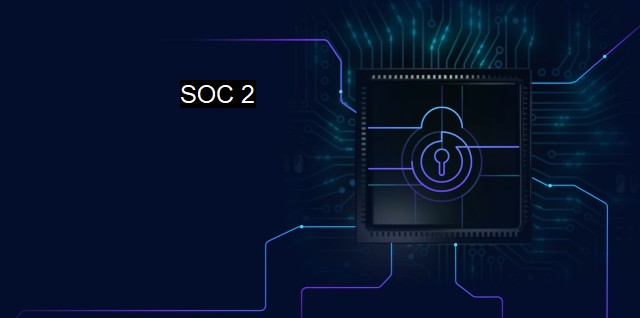What is SOC 2?
SOC 2 Certification: A Powerful Tool for Demonstrating Cybersecurity Measures and Building Customer Trust in the Digital Age
SOC 2 stands for System and Organization Controls 2, a type of compliance audit designed to ensure that outsourced service providers securely manage data to protect the privacy and interests of their clients and the integrity of the service. It was developed by the American Institute of CPA’s (AICPA) to specifically address controls pertinent to IT and related processes. SOC 2 represents a gold standard in technology data security, an essential element in the cybersecurity and antivirus industry.While SOC 2, cybersecurity, and antivirus interaction may seem complex, understanding their relations brings clarity to the whole process involved. antivirus software is one of the key elements used to protect systems against threats. Regardless of the scale of operations, every entity interacting with the digital space is a potential target of cyber threats. Therefore, a robust antivirus solution often forms part of the overall cybersecurity policy.
Having antivirus software alone may not be enough to guarantee data protection. The software has to meet some standard level to ensure that the security it provides is up to the task. This is where SOC 2 comes in. Compliance with SOC 2 means that a service organization has met the stringent criteria set out for handling customer data. It’s an indication that the company takes extraordinary measures to guard their systems and data entrusted to them from disruptions that could compromise the security, privacy, and processing integrity of that system.
SOC 2 compliance centers around five principles: Security, Availability, Processing Integrity, Confidentiality, and Privacy. The Security principle concerns protecting systems and data from unauthorized access, making it extremely relevant to cybersecurity and antivirus software. Availability deals with the system's operability and accessibility for use as agreed upon. Processing integrity ensures data is complete, accurate, authorized and delivered timely, ensuring the culmination of tasks correctly. Confidentiality relates to limiting information access and disclosure to authorized parties, and lastly, the Privacy principle, refers to managing the collection, use, and retention of personal information in conformity with an organization's privacy notice and agreed criteria.
Compliance to SOC 2 requires a series of activities targeted towards the set protocols. For antivirus software, attaining SOC 2 compliance means creating specific rules set out to monitor software to detect threat patterns. This can include heuristic unknown threat detection, consistent rule-based monitoring, and more sophisticated machine-based learning. All these discoveries can prevent invasions and take corrective actions promptly without allowing opportunities for operations and data compromise.
A SOC 2 compliance audit entails meticulously examining a company's non-financial reporting controls as they relate to the Trust Services Categories. This involves ensuring the systems are secure, available, with integrity in processing, confidentiality, and approved privacy concepts maintained.
SOC 2 impacts antivirus software and cybersecurity on another level. In most cases, the security of the service providers reflects the security of the antivirus software. This is because antivirus software is mostly an 'as a service' offering, implying that if a vulnerability exists in the operational element of the service provider, it opens a potential risk for the client's systems as well. Therefore, SOC 2 compliance aids in enhancing safety lines in both antivirus software and overall cybersecurity services to confirm the credibility and reliability of the services offered.
SOC 2 is a vital piece of the cybersecurity puzzle. It offers an added level of assurance that service providers are managing and securing data properly, which gives companies a higher level of confidence when selecting vendors or service providers. It is a comprehensive framework that clearly works hand-in-hand with antivirus software and other cybersecurity solutions to help protect the confidentiality and integrity of data in the digital landscape.

SOC 2 FAQs
What is SOC 2 and how does it relate to cybersecurity?
SOC 2 is a type of audit report that assesses a company's controls related to the security, availability, processing integrity, confidentiality, and privacy of customer data. It is often used to demonstrate a company's commitment to cybersecurity and data protection.Why is SOC 2 important for antivirus software companies?
Antivirus software companies often handle sensitive customer data and need to assure their customers that their systems and processes are secure. SOC 2 provides a standardized framework for demonstrating a company's security controls and helps build trust with customers.What is the difference between SOC 2 and SOC 1?
SOC 2 assesses a company's controls related to the five trust service categories mentioned earlier, while SOC 1 assesses a company's internal control over financial reporting. SOC 2 is more focused on data security than SOC 1, which is more focused on financial control.How can a company prepare for a SOC 2 audit?
Preparing for a SOC 2 audit involves identifying the areas of the business that need to be assessed, documenting policies and procedures, and implementing controls to address any gaps. It is important to involve all relevant stakeholders in the preparation process and engage an experienced auditor to help ensure a successful audit.| | A | | | B | | | C | | | D | | | E | | | F | | | G | | | H | | | I | | | J | | | K | | | L | | | M | |
| | N | | | O | | | P | | | Q | | | R | | | S | | | T | | | U | | | V | | | W | | | X | | | Y | | | Z | |
| | 1 | | | 2 | | | 3 | | | 4 | | | 7 | | | 8 | | |||||||